#Rollo Torpey
Explore tagged Tumblr posts
Photo
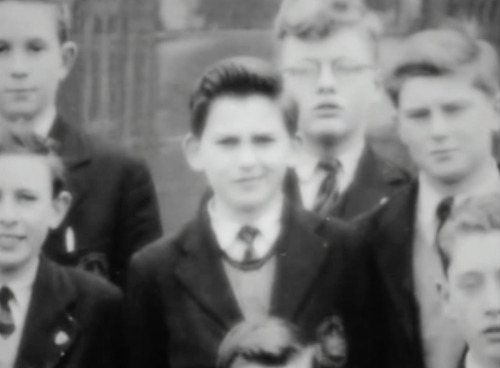

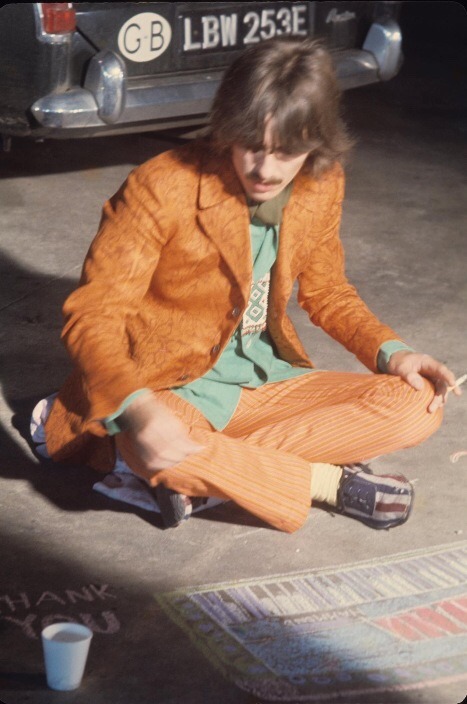
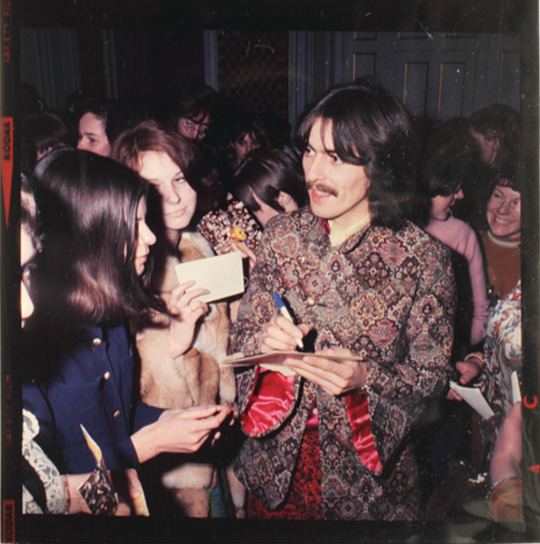
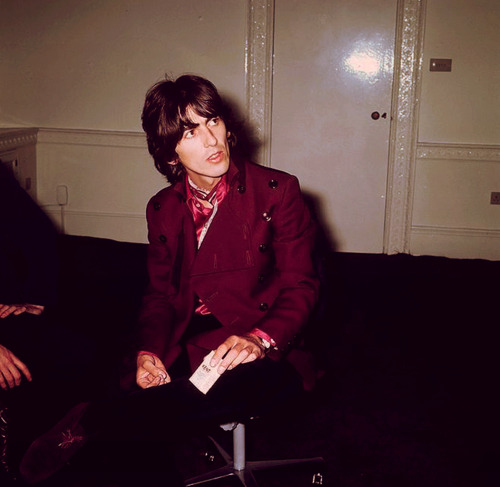




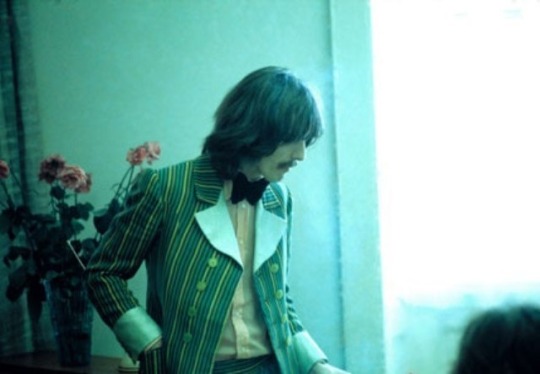
A style selection, 1956-1969.
A continuation of sorts from this post.
“[George’s] idea, which he ordered [in Liverpool in the 1950s], was a four-button jacket with cloth-covered buttons. Two breast pockets which were slitted (jetted) and in the shape of a bird in flight, the two side pockets corresponded. The cuffs had to be folded back with a cloth-covered button. His trousers had no pleats in the front, not normal in those days, and he was by far the very first person to have two slits at the bottom side seam of the trouser and he wanted them folded back with cloth covered buttons to match the cuffs on his jacket. The workshop queried the order when they received thinking we had gone bonkers. George got his suit and was pleased with the outcome. Later lots of guys were walking about town with cut back cuffs and side seams on their trousers, but George was the first.” - Rollo Torpey, The Beatles and Me (2015)
“At Iris’s 14th birthday party, I remember George turned up in a brand-new, Italian-style stuff with covered buttons. He looked very grown-up.” - Violet Caldwell (mother of Iris, and Alan, a.k.a. Rory Storm), The Beatles Monthly September 1965
“[George’s mother Louise] took an unusually benign view of George’s luminous pink shirts, yellow waistcoat, and drainpipe trousers.” - Pete Shotton, The Beatles, Lennon, And Me (1984)
“Going in for flash clothes, or at least trying to be a bit different, as I hadn’t any money, was part of the rebelling. I never cared for authority. They can’t teach you experience; you’ve got to go through it, by trial and error.” - George Harrison, The Beatles: The Authorized Biography (1968)
“At the Institute, George was known from the beginning as a way-out dresser. Michael McCartney, Paul’s brother, was a year below him. He remembers George always having long hair — years before anybody else did. […] ‘George used to go to school with his school cap sitting high on top of his hair,‘ says Mrs. Harrison. ‘And very tight trousers. Unknown to me, he’d run them up on my machine to make them even tighter. I bought him a brand-new pair once and the first thing he did was tighten them. When his dad found out, he told him to unpick them at once. “I can’t, Dad,” he said. “I’ve cut the pieces off.”’” - The Beatles: The Authorized Biography (1968)
“I’d started to develop my own version of the school uniform. I had some cast-offs from my brother. One was a dog-toothed check-patterned sports coat, which I’d dyed black to use as my school blazer. The color hadn’t quite taken, so it still had a slight check design to it. I had a shirt I’d bought in Lime Street, that I thought was so cool. It was white with pleats down the front. and it had embroidery along the corners of the pleats. I had a waistcoat that John had given me, which he’d got from his ‘uncle’ Dykins (his mother’s boyfriend), Mr. Twitchy Dykins. It was like an evening-suit waistcoat — black, double-breasted, with lapels. The trousers John also gave me, soon after we first met — powder-blue drainpipes with turn-ups. I dyed them black as well. And I had black suede shoes from my brother. […] That outfit of mine was very risky, and it felt like all day, every day, for the last couple of years I was going to get busted. In those days we used Vaseline on our hair to get the rock n’ roll greased-back hairstyle. Also, you were supposed to wear a cap and a tie, and a badge on your blazer. I didn’t have my badge stitched on, I had it loose. It was held in place by a pen clipped over it in my top pocket, so I could remove it easily, and the tie.” - George Harrison, The Beatles Anthology (2000)
“He was always a pretty snappy dresser, and he did always like that waistcoat look. And he used to wear a V-neck Fair Isle jumper. Sometimes he’d be a little too outrageous, like purple trousers with bright green, but it was fine. Everything seemed to be fine then.” - Pattie Boyd, interview for the British Beatles Fan Club
“The boys are wearing all sorts of fantastic clothes for their film and introduce a very new, unusual gimmick. If they’re wearing corduroy, for example, then they have corduroy boots to match. If they’re seen in velveteen suits, then they’re coupled with velveteen boots. George first thought of the idea two years ago, but when he put the idea to a local bootmaker, he told him it couldn’t be done. Well, that’s one cobbler that’s been proved wrong.” - The Beatles Monthly, June 1965 (x)
#George Harrison#quote#quotes about George#1950s#1960s#Pete Shotton#Vi Caldwell#Rollo Torpey#Pattie Boyd#The Beatles#Harrison style#:)#Paul McCartney#John Lennon#Ringo Starr#fits queue like a glove
394 notes
·
View notes
Text
Especial MR. BIG. Repasamos su historia
En Rock and Blog Seguimos con nuestra ronda de especiales dedicados a los grandes del HARD ROCK. Hoy le toca el turno a MR. BIG.
En Rock And Blog seguimos con las buenas costumbres, y hoy, aprovechando que tienen disco nuevo, del que puedes ver nuestra opinión aquí, y que van a venir a visitarnos, puedes informarte en este enlace, os contamos la vida y milagros de otros de los grandes del Hard Rock, Mr. Big.
[the_ad id=»7218″]
Rondando el año 1988, Billy Sheehan, bajista, muy conocido ya por su labor con el instrumento de las cuatro en el grupo alas, y sobre todo con David Lee Roth, tenía la idea de crear una banda que tuviera un rollo más duro, más Hard Rock, con ritmos rápidos y potentes. Tras hablar con unos y con otros, las malas, o las buenas, lenguas, hablan de que hubo contactos con Turner y con Malmsteen, al final, la formación final de Mr. Big quedó completada con Eric Martin, voz, que venía de trabajar más bien en solitario, y con un discazo, totalmente recomendable, Sucker For a Pretty Face, Pat Torpey, batería, que había trabajado para Stan Bush, Ted Nugent, Impelliteri, y Paul Gilbert, considerado uno de los virtuosos de la guitarra y que venía de foguearse en Razer X.
Mr. Big publica su primer trabajo en 1989
Los cuatro, ya como Mr. Big, y tras conseguir firma discográfica, lanzan en 1989, su primer disco, Mr. Big, con el que consiguieron relativo éxito en el mundo y exitazo en Japón. Este logro haría lo que sería una de las principales características de esta banda, ser auténticos ídolos en aquel país, donde incluso por estornudar son aclamados.
Mr. Big es un discazo, lleno de grandes melodías, la voz de Eric Martin, tan dulce y tan diferente de los cánones del cantante heavy, y a la vez contundente y rápido. Posee una batería de gran calidad, y unos grandes riffs de guitarra, conjuntados de una manera soberbia con un bajo, que más bien es una guitarra rítmica, hacen de ese disco de los mejores, por no decir el mejor de ese año.
El pelotazo lo dan en 1991
En el año 1991 sale su segundo disco, Lean Into It. Con la canción To Be With You dieron un auténtico pelotazo, y con Just Take My Heart casi otro tanto, por lo que tras este disco se formó su segunda gran característica, bandaza de baladas, tanto ñoñas como al más estilo balada del heavy. Con todo y con eso, Lean Into It también está lleno de esa fuerza hardrockera de las grandes guitarras y bajos rápidos, así lo demuestran temas como Green-Tinted Sixties Mind, Alive And Kickin´.
En 1993 sacaron su tercer disco, Bump Ahead, que sigue la senda de los dos anteriores, temas contundentes, como Colorado Bulldog, Price You Gotta Pay , y medios tiempos maravillosos y para todos los tiempos, como Promise Her The Moon, o Wild World, una versión del tema de Cat Stevens.
Le cogieron el gusto a esto de los medios tiempos y baladas, y con su cuarto disco, Hey Man, del año 1996, ya se centran más en ese tipo de temas.
Y llegan los problemas…
Take Cover, Going Where The Wind Blows, The Chain, etc, hacen de Hey Man un buen disco, pero un poco alejado de la idea original de la banda, lo que desencadena uno de los puntos de inflexión, la marcha de Paul Gilbert, buscaba centrarse en su carrera en solitario, y reflotar su anterior banda, Razer X, cuyo estilo es más duro y heavy.
Lejos de abandonar, los tres miembros restantes reclutan a Richie Kotzen, antiguo miembro de Poison, y conocido también por su estilo más blusie y natural, totalmente distinto a Paul Gilbert.
Con Kotzen en sus filas, sacan dos discos, también de calidad, pero con un rollo definitivamente muy distinto a por lo que fue parida la banda. Get Over It, del año 1999, y Actual Size, del 2001, que fueron auténticos pelotazos en Japón.
…hasta que la situación se hace insoportable
A pesar del exitazo de ambos discos en Japón, todo se viene abajo, y Billy Sheehan, no olvidemos que es el padre de la criatura, no aguanta más y decide mandar todo al carajo, deja la banda, os recomendamos que veáis el video Shine, donde se ve gráficamente lo que narramos, dejando, incluso, comprometida, toda una gira por Japón.
youtube
Los motivos de su marcha básicamente eran dos: El primero, que la banda ya no era lo que él quería y lo que él había formado, ahora se habían convertido en una banda de baladas y medios tiempos, y con poca ambición, se conformaban con tocar los días justos, y a poder ser, solo en Japón, para poder vivir el resto del año. El segundo que no aguantaba más a Eric Martin, según él, e incluso reconocido por el mismo Martin, su inmadura personalidad y comportamiento eran inaguantables. Hablan también de que tanto Paul Gilbert, como Torpey e incluso Kotzen, el nuevo, le tocaron la cara y no para darle caricias.
[the_ad id=»7218″]
Mucho lo intentaron Eric, y sobre todo de Pat Torpey, el auténtico caballero y paciente de la banda para intentar solucionarlo, pero no hubo nada que hacer. Se habló de reemplazar a Sheehan, pero esa idea era muy absurda, Sheehan fundó la banda, y nadie sería capaz de interpretar sus temas con la misma técnica y pasión.
Nos hacemos mayores y los problemas se hacen pequeños
Pero afortunadamente, el tiempo pasa, la gente madura, y en el 2009, deciden reunirse, los miembros originales, para celebrar los veinte años de su primer disco, haciendo un concierto, ¿dónde?, pues en Japón, donde iba a ser.
Tras esos primeros contactos ven que vuelven a aguantarse y sacan ese directo con dos canciones nuevas, Next Time Around y Hold Your Head Up. Esas dos canciones nuevas dejan un hilo de esperanza en que la reunión puede ser durarera y así ocurre, en 2011, sacan What If… en 2014, Stories We Could Tell y en 2017, Defying Gravity. Tres discos llenos de melodías, riffs, contundencia, aunque más reposados, más de virtuosismo y sin ese aire tan Hard Rock clásico, pero sin duda, llenos de calidad, como no podía ser de otra manera al estar hechos por auténticos genios.
Hasta aquí la historia de, sin duda, unos de los grandes, y que nos os podéis perder, ni en disco, ni en directo, que es brutal.
Y ahora, y como siempre, a disfrutar con unos cuantos temas de estos GRANDES, MR. BIG
youtube
youtube
youtube
youtube
youtube
youtube
youtube
youtube
youtube
Artículo realizado por Ape Navarro
Especial MR. BIG. Repasamos su historia was originally published on Rock and Blog
0 notes
Photo

George Harrison in January 1969, in a screenshot from Get Back.
A decade earlier...
“I was living in Beverley Road, L15, and George Harrison’s cousin lived in the next road, which was Bristol Road. George was a regular visitor, and we all became teenage friends. At this time, George was still at school. We were all very much into fashion and, of course, the music of the day. George, who knew I was [working] at Neville Reed (a very popular up to the minute tailoring outlet) made arrangements to come to the shop, as he was interested in ordering a suit. […] [George] was a very individual guy with his own idea of what he wanted. His idea, which he ordered, was a four-button jacket with cloth-covered buttons. Two breast pockets which were slitted (jetted) and in the shape of a bird in flight, the two side pockets corresponded. The cuffs had to be folded back with a cloth-covered button. His trousers had no pleats in the front, not normal in those days, and he was by far the very first person to have two slits at the bottom side seam of the trouser and he wanted them folded back with cloth covered buttons to match the cuffs on his jacket. The workshop queried the order when they received thinking we had gone bonkers. George got his suit and was pleased with the outcome. Later lots of guys were walking about town with cut back cuffs and side seams on their trousers, but George was the first.” - Rollo Torpey, The Beatles and Me (2015) (x)
64 notes
·
View notes